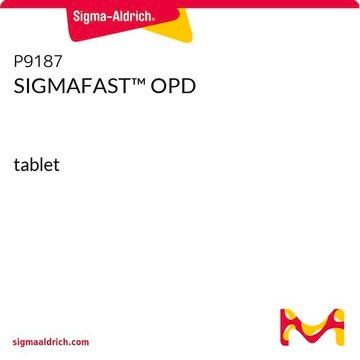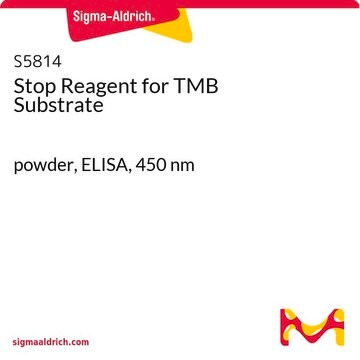T2885
3,3′,5,5′-Tetramethylbenzidine
TMB substrate, chromogenic, ≥98% (TLC), powder
Synonym(s):
BM blue, Sure Blue TMB, TMB, TMB Blotting Plus, TMB substrate
About This Item
Recommended Products
product name
3,3′,5,5′-Tetramethylbenzidine, ≥98% (TLC)
Assay
≥98% (TLC)
form
powder
mp
168-171 °C (lit.)
solubility
ethyl acetate: 50 mg/mL, clear to very slightly hazy
storage temp.
2-8°C
SMILES string
Cc1cc(cc(C)c1N)-c2cc(C)c(N)c(C)c2
InChI
1S/C16H20N2/c1-9-5-13(6-10(2)15(9)17)14-7-11(3)16(18)12(4)8-14/h5-8H,17-18H2,1-4H3
InChI key
UAIUNKRWKOVEES-UHFFFAOYSA-N
Looking for similar products? Visit Product Comparison Guide
Related Categories
Application
- as a supplement in Man-Rodosa-Sharpe (MRS) agar plate, to stains the lactobacilli colonies blue in the presence of O2
- as a substrate solution for ELISA (enzyme-linked immunosorbent assay)
- in myeloperoxidase activity assay to quantify neutrophil
Biochem/physiol Actions
Packaging
Signal Word
Warning
Hazard Statements
Precautionary Statements
Hazard Classifications
Acute Tox. 4 Oral - Aquatic Chronic 4 - Carc. 2
Storage Class Code
11 - Combustible Solids
WGK
WGK 3
Flash Point(F)
Not applicable
Flash Point(C)
Not applicable
Personal Protective Equipment
Certificates of Analysis (COA)
Search for Certificates of Analysis (COA) by entering the products Lot/Batch Number. Lot and Batch Numbers can be found on a product’s label following the words ‘Lot’ or ‘Batch’.
Already Own This Product?
Find documentation for the products that you have recently purchased in the Document Library.
Customers Also Viewed
Articles
NBT-BCIP substrate system aids in western blotting and immunohistological staining, producing a blue-purple insoluble end product.
Our team of scientists has experience in all areas of research including Life Science, Material Science, Chemical Synthesis, Chromatography, Analytical and many others.
Contact Technical Service











